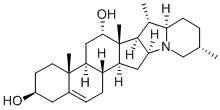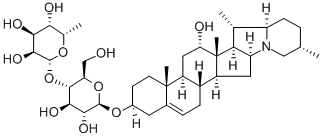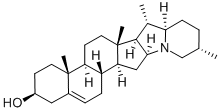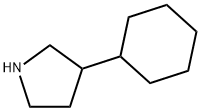RUBIJERVINE
- CAS NO.:79-58-3
- Empirical Formula: C27H43NO2
- Molecular Weight: 413.64
- SAFETY DATA SHEET (SDS)
- Update Date: 2022-12-21 16:56:50

What is RUBIJERVINE?
Description
First isolated by Wright and Luff from Veratrum album and V. viride, the original formula of C26H4302N was altered by Jacobs and Craig to that given above. The base crystallizes from aqueous EtOH or Me2CO as the monohydrate. It has [α]D + 19° (EtOH) and is a tertiary base, both oxygen atoms being in the form of non-phenolic hydroxyl groups. The hydrobromide has m.p. 265-270°C; the hydriodide, m.p. 293-6°C (26l-2°C); the diacetyl derivative has m.p. l60-3°C and the p-bromobenzoyl compound melts at 254-6°C (dec.). On catalytic hydrogenation it yields the dihydro derivative, m.p. 222°C from which a diacetyl compound, m.p. 2l6-9°C may be prepared. Selenium dehydrogenation of the base at 340°C furnishes 5-methyl-2- ethylpyridine and a high proportion of a hydrocarbon, C18H16, m.p. 74-7°C which yields a picrate, m.p. 131-2°C and a syrn-trinitrobenzene additive compound, m.p. l44-5°C. The alkaloid undergoes the usual sterol reactions, e.g. the Oppenauer process gives a ketone, rubijervone, m.p. 205-9°C; [α]30D + 100° (EtOH) which is reduced by sodium isopropoxide to the corresponding epimeric alcohols. The earlier structure has been revised to 22G'H, 25{3H-solanid- 5-en-3{3,12G'-diol.
Purification Methods
Rubijervine crystallises from 95% EtOH as colourless rods. It has solvent of crystallisation and is dried at 120o/2mm. It is precipitated by digitonin. The hydrobromide crystallises from MeOH/Me2CO with m 265-270o(dec). The diacetate crystallises from MeOH with m 160-163o. The 3-benzoate gives colourless prisms from *C6H6 with m 156-159o and [] D 27.5 +22o (c 1.6, CHCl3). [Pelletier & Locke J Am Chem Soc 79 4531 1957, Jacobs & Craig J Biol Chem 148 41 1943, Beilstein 21 III/IV 2310.]
References
Poethke., Arch. Pharrn., 276, 170 (1938)
Jacobs, Craig.,J. Bioi. Chern., 148,41 (1943)
Jacobs, Craig., ibid, 149,451 (1943)
Jacobs, Craig., ibid, 159, 617 (1945)
Jacobs, Craig., ibid, 160,555 (1945)
Sato, Jacobs., ibid, 179,623 (1949)
Stereochemistry:
Hohne et al., Tetrahedron, 22,673 (1966)
Properties of RUBIJERVINE
| Melting point: | 240-246° |
| Boiling point: | 532.75°C (rough estimate) |
| alpha | D25 +19.0° (ethanol) |
| Density | 1.0159 (rough estimate) |
| refractive index | 1.6400 (estimate) |
Safety information for RUBIJERVINE
Computed Descriptors for RUBIJERVINE
New Products
4-Fluorophenylacetic acid 4-Methylphenylacetic acid N-Boc-D-alaninol N-BOC-D/L-ALANINOL Tert-butyl bis(2-chloroethyl)carbamate 3-Morpholino-1-(4-nitrophenyl)-5,6-dihydropyridin- 2(1H)-one Furan-2,5-Dicarboxylic Acid Tropic acid S-2-CHLORO PROPIONIC ACID ETHYL ISOCYANOACETATE 2-Bromo-1,3-Bis(Dimethylamino)Trimethinium Hexafluorophosphate (6-METHYL-[1,3]DITHIOLO[4,5-b]QUINOXALIN-2-ONE INDAZOLE-3-CARBOXYLIC ACID 4-IODO BENZOIC ACID (2-Hydroxyphenyl)acetonitrile 4-Bromopyrazole 5,6-Dimethoxyindanone 2-(Cyanocyclohexyl)acetic acid 4-methoxy-3,5-dinitropyridine 2-aminopropyl benzoate hydrochloride 1-(4-(aminomethyl)benzyl)urea hydrochloride diethyl 2-(2-((tertbutoxycarbonyl)amino) ethyl)malonate tert-butyl 4- (ureidomethyl)benzylcarbamate Ethyl-2-chloro((4-methoxyphenyl)hydrazono)acetateRelated products of tetrahydrofuran
You may like
-
 2033-24-1 98%View Details
2033-24-1 98%View Details
2033-24-1 -
 42831-50-5 5-METHYLISOXAZOLE-4-CARBOXYLIC ACID 98%View Details
42831-50-5 5-METHYLISOXAZOLE-4-CARBOXYLIC ACID 98%View Details
42831-50-5 -
 1975-50-4 98%View Details
1975-50-4 98%View Details
1975-50-4 -
 2-HYDROXY BENZYL ALCOHOL 98%View Details
2-HYDROXY BENZYL ALCOHOL 98%View Details
90-01-7 -
 2-Chloro-1,3-Bis(Dimethylamino)Trimethinium Hexafluorophosphate 221615-75-4 98%View Details
2-Chloro-1,3-Bis(Dimethylamino)Trimethinium Hexafluorophosphate 221615-75-4 98%View Details
221615-75-4 -
 61397-56-6 CIS BROMO BENZOATE 98%View Details
61397-56-6 CIS BROMO BENZOATE 98%View Details
61397-56-6 -
 14714-50-2 (2-Hydroxyphenyl)acetonitrile 98+View Details
14714-50-2 (2-Hydroxyphenyl)acetonitrile 98+View Details
14714-50-2 -
 118753-70-1 98+View Details
118753-70-1 98+View Details
118753-70-1



